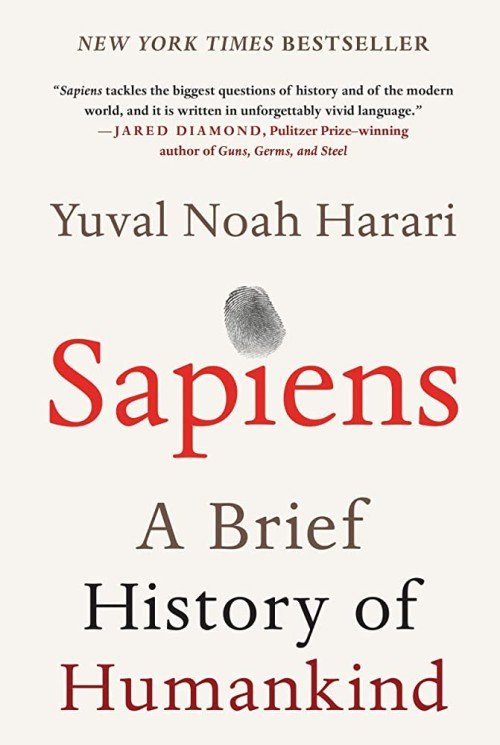
Sapiens: A Brief History of Humankind, written by Yuval Noah Harari, is an intriguing and thought-provoking book that explores the history of humankind from the emergence of Homo sapiens in Africa to the present day.
The book is divided into four parts: The Cognitive Revolution, The Agricultural Revolution, The Unification of Humankind, and The Scientific Revolution. In each section, Harari explores the major developments that have shaped human history and explains how they have impacted our society.
The Cognitive Revolution is the first part of Yuval Noah Harari's book Sapiens, in which he explores the emergence of Homo sapiens and the development of human consciousness.
Harari argues that the Cognitive Revolution, which occurred around 70,000 years ago, was a turning point in human history. It was during this time that Homo sapiens began to develop the ability to think and communicate in abstract terms, allowing them to create myths, religions, and cultures.
According to Harari, the key factor that allowed Homo sapiens to develop this ability was the evolution of language. The ability to communicate with one another using symbolic language allowed humans to share ideas, beliefs, and knowledge in a way that no other species could.
This development led to the creation of a shared collective consciousness that allowed humans to cooperate and work together on a larger scale. It also allowed humans to develop tools and technology that could be passed down from generation to generation, further enhancing their ability to survive and thrive.
However, the Cognitive Revolution also had its downsides. Harari argues that it led to the development of complex social structures, including hierarchies and power structures, which have led to inequality and oppression throughout human history.
Overall, the Cognitive Revolution was a crucial development in human history, setting the stage for the many advances and challenges that have shaped our world today. Harari's exploration of this period offers a fascinating look at how humans came to be the dominant species on the planet.
The Agricultural Revolution is the second part of Yuval Noah Harari's book Sapiens, in which he explores the transition of humans from hunter-gatherer societies to agricultural societies.
Harari argues that the Agricultural Revolution, which occurred around 12,000 years ago, was a significant turning point in human history, as it marked the beginning of a new era of human civilization. This shift from hunting and gathering to agriculture led to the development of permanent settlements and the growth of human populations.
The Agricultural Revolution allowed humans to produce a more reliable and abundant food supply, which in turn allowed for the growth of cities, trade, and the specialization of labor. However, it also brought about significant social changes, such as the emergence of social hierarchy and the ownership of land and resources. This led to the development of complex societies with class divisions, slavery, and gender inequality.
Moreover, the Agricultural Revolution also led to the domestication of animals, which allowed for the development of animal husbandry, transportation, and warfare. It also led to the creation of new diseases that spread rapidly through human populations.
Harari argues that while the Agricultural Revolution was a significant development in human history, it also brought about many challenges and negative consequences. For example, the shift to agriculture led to the depletion of natural resources, deforestation, and the loss of biodiversity.
The Unification of Humankind is the third part of Yuval Noah Harari's book Sapiens, in which he explores the ways in which human societies have become more interconnected and integrated over time.
Harari argues that the Unification of Humankind has been driven by several key factors, including the development of religion, imperialism, and capitalism. These forces have allowed humans to create shared beliefs and values, as well as to establish trade and economic systems that span the globe.
One of the most significant developments in the Unification of Humankind, according to Harari, was the emergence of large-scale religions, such as Christianity and Islam. These religions created a shared set of beliefs and values that allowed people from different cultures and backgrounds to come together and cooperate on a larger scale.
The rise of imperialism also played a significant role in the Unification of Humankind. Imperial powers such as the British Empire created vast networks of trade and commerce that connected people from different parts of the world. This led to the creation of new technologies and economic systems that have had a profound impact on human society.
Finally, Harari argues that the development of capitalism has been a major force in the Unification of Humankind. Capitalism has allowed for the creation of global economic systems that span national borders and connect people from different parts of the world. This has led to the creation of a global consumer culture and has had a significant impact on the environment and social inequality.
Overall, Harari's exploration of the Unification of Humankind offers a fascinating perspective on how human societies have become increasingly interconnected and integrated over time. He argues that while these developments have led to many benefits, such as increased cooperation and economic growth, they have also created significant challenges and negative consequences, such as environmental degradation and social inequality.
One of the most compelling aspects of the book is Harari's ability to synthesize a vast amount of information into a cohesive narrative that is both informative and engaging. He seamlessly weaves together biology, anthropology, history, and sociology to create a comprehensive and compelling account of human history.
Harari also challenges many of the assumptions we have about our history, such as the idea that the Agricultural Revolution was a positive development that allowed for the growth of civilization. Instead, he argues that the shift from hunting and gathering to agriculture actually led to a decline in human health and wellbeing and created a system of social inequality that persists to this day.
Another fascinating aspect of the book is Harari's discussion of the role of fiction in human society. He argues that our ability to create and believe in stories has been a key factor in our success as a species, allowing us to cooperate on a large scale and build complex societies.
While the book is packed with fascinating insights and ideas, there are some criticisms to be made. One is that Harari tends to oversimplify complex issues and gloss over important details in order to maintain a clear and compelling narrative. Additionally, some readers may find his arguments to be overly deterministic, suggesting that human history has been determined by a small set of factors rather than being the result of complex interactions between a wide range of factors.
Overall, Sapiens is a thought-provoking and engaging book that offers a fresh perspective on human history. Harari's ability to synthesize complex information and present it in an accessible and compelling way makes this book an excellent read for anyone interested in history, anthropology, or the human condition.








